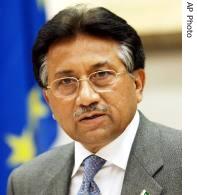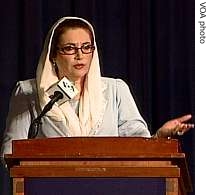2007年VOA标准英语-Former Political Rivals Team Up Against Pakista
时间:2019-01-13 作者:英语课 分类:2007年VOA标准英语(五月)
Washington
22 May 2007
The growing political crisis in Pakistan has driven two onetime rivals into an alliance. Former prime ministers Benazir Bhutto and Nawaz Sharif, who are both in exile, have teamed up to raise the pressure on President Pervez Musharraf for a return to civilian 1 democratic rule. VOA correspondent Gary Thomas talked to both former leaders to see how they are working together in the current crisis, and files this report.
From 1988 to 1999, Benazir Bhutto and Nawaz Sharif were the lead players on Pakistan's political stage. Their rivalry 2 was intense and bitter.

Pervez Musharraf
Now it is President Pervez Musharraf who is in political trouble, and, from their respective exiles, Ms. Bhutto and Mr. Sharif are in an alliance seeking to bring about an end to his military rule and a return to democratic civilian government.
In a phone interview with VOA, Mr. Sharif says Mr. Musharraf is on his way out.
"I think his options are not only limited, but exhausted," he said. "He has lost his writ 3. The writ of the government is also at its lowest ebb 4. And Musharraf is taking one action after another which is backfiring."
The Bhutto-Sharif rivalry dominated Pakistan's politics in the 1990s as the country attempted a transition from another military ruler, General Zia Ul-Haq, to democracy. Mr. Sharif and Ms. Bhutto each held the post of prime minister twice, but neither of them ever completed a full five-year term. When one was in office, the opposition 5 rival would scheme to have the president fire the prime minister. This pendulum 6 of power ended when General Musharraf took power from Mr. Sharif in a coup 7 in 1999, and both ex-leaders were forced into exile.
Today, says Mr. Sharif, his relationship with Ms. Bhutto is "cordial," as he termed it, and that they consult on national issues. He says that whatever the outcome of the upcoming elections later this year, he and his onetime rival are determined 8 not to revive the bitter partisanship 9 of the past.
"Of course, the elections will be between Benazir Bhutto and our party, and we'll be fighting the elections against each other," she said. "But that doesn't mean that we have to oppose each other in the same fashion as we opposed in the 1990s. We have learned from some mistakes that were committed in the past, and there will be a good relationship between the opposition and the government, whosoever comes into the government, whosoever is in the opposition. We will see to it that there is a healthy opposition-government relationship."

Benazir Bhutto (file photo)
In a separate VOA interview, Ms. Bhutto says the alliance between her Pakistan Peoples' Party, or PPP, and Mr. Sharif's party, known as the Pakistan Muslim League-Nawaz, is intact, and she would like to keep it that way. However, she says, there is a key difference: Mr. Sharif would like to bring the coalition 10 of Islamist religious parties, known as the MMA, into the opposition alliance. But Ms. Bhutto wants to keep the religious parties away.
"In the past he [Sharif] has worked closely with some of those religious parties, and he is comfortable with them," she said. "But we in the PPP would like to stay away from the religious parties because we would like to send a clear message that the choice in Pakistan is not just between military dictatorship and religious dictatorship. There is a third alternative, and that alternative is a moderate, democratic alternative. So we are trying to avoid coming into an alliance with the MMA. But at the same time, we want to keep our alliance with Mr. Nawaz Sharif intact."
Mr. Sharif says fears about the power of the Islamist parties is overblown, noting that they have never fared well in parliamentary elections, and that Mr. Musharraf is trying to scare the West, and in particular, the United States to support him.
"It is Mr. Musharraf trying to hoodwink the West by giving a false impression that if he is not there, the vacuum will be filled by the Islamists," he said. "No vacuum in Pakistan can be filled by anybody except moderates in Pakistan. We are a moderate party. Benazir Bhutto's party is a moderate party. And it is always between us and her in Pakistan, you see?"
Mr. Sharif also criticized the Bush administration for continuing to support military rule in Pakistan.
"President Bush is preaching democracy in Iraq, he is preaching democracy in Afghanistan, but he is supporting 'uniform democracy' in Pakistan, he is supporting a uniformed president in Pakistan," he said. "How would you like it if I say that President Bush were to start wearing a military uniform in America? So I think this is not fair that he is supporting one individual against the entire nation in Pakistan? So we all feel very hurt by this."
But Richard Boucher, U.S. Assistant Secretary of State for South Asia, tells VOA that President Musharraf is making progress in moving toward elections and battling Islamist insurgents 11 operating out of Pakistan's tribal 12 areas.
"I think the Pakistani government is moving forward," he said. "They're moving towards elections. President Musharraf, I think, spoke 13 about that process. So I recognize the tensions that exist. I recognize these issues do need to be settled. But I think that both the creation of a more modern, democratic state in Pakistan and the fight against insurgency 14 are going forward."
But President Musharraf has said neither Benazir Bhutto nor Nawaz Sharif would be allowed back into the country for the elections. Both former prime ministers have said they will defy the ban.
- There is no reliable information about civilian casualties.关于平民的伤亡还没有确凿的信息。
- He resigned his commission to take up a civilian job.他辞去军职而从事平民工作。
- The quarrel originated in rivalry between the two families.这次争吵是两家不和引起的。
- He had a lot of rivalry with his brothers and sisters.他和兄弟姐妹间经常较劲。
- This is a copy of a writ I received this morning.这是今早我收到的书面命令副本。
- You shouldn't treat the newspapers as if they were Holy Writ. 你不应该把报上说的话奉若神明。
- The flood and ebb tides alternates with each other.涨潮和落潮交替更迭。
- They swam till the tide began to ebb.他们一直游到开始退潮。
- The party leader is facing opposition in his own backyard.该党领袖在自己的党內遇到了反对。
- The police tried to break down the prisoner's opposition.警察设法制住了那个囚犯的反抗。
- The pendulum swung slowly to and fro.钟摆在慢慢地来回摆动。
- He accidentally found that the desk clock did not swing its pendulum.他无意中发现座钟不摇摆了。
- The monarch was ousted by a military coup.那君主被军事政变者废黜了。
- That government was overthrown in a military coup three years ago.那个政府在3年前的军事政变中被推翻。
- I have determined on going to Tibet after graduation.我已决定毕业后去西藏。
- He determined to view the rooms behind the office.他决定查看一下办公室后面的房间。
- Her violent partisanship was fighting Soames's battle. 她的激烈偏袒等于替索米斯卖气力。
- There was a link of understanding between them, more important than affection or partisanship. ' 比起人间的感情,比起相同的政见,这一点都来得格外重要。 来自英汉文学
- The several parties formed a coalition.这几个政党组成了政治联盟。
- Coalition forces take great care to avoid civilian casualties.联盟军队竭尽全力避免造成平民伤亡。
- The regular troops of Baden joined the insurgents. 巴登的正规军参加到起义军方面来了。 来自《简明英汉词典》
- Against the Taliban and Iraqi insurgents, these problems are manageable. 要对付塔利班与伊拉克叛乱分子,这些问题还是可以把握住的。 来自互联网
- He became skilled in several tribal lingoes.他精通几种部族的语言。
- The country was torn apart by fierce tribal hostilities.那个国家被部落间的激烈冲突弄得四分五裂。
- They sourced the spoke nuts from our company.他们的轮辐螺帽是从我们公司获得的。
- The spokes of a wheel are the bars that connect the outer ring to the centre.辐条是轮子上连接外圈与中心的条棒。
- And as in China, unrest and even insurgency are widespread. 而在中国,动乱甚至暴乱都普遍存在。 来自互联网
- Dr Zyphur is part an insurgency against this idea. 塞弗博士是这一观点逆流的一部分。 来自互联网